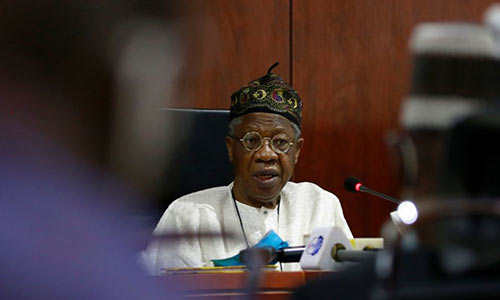In 2014, the Minister of Information, Lai Mohammed, acknowledged the International Criminal Court (ICC) as the court of last resort. This was during his presentation as the former National Publicity Secretary of the All Progressives Congress (APC) before the House of Commons, London, on 8 September 2014. He acknowledged the mandate of the ICC as a court “Expected to exercise its jurisdiction only if states themselves are unwilling or unable to genuinely investigate and prosecute international crimes.” He made these remarks as an opposition party member, while analyzing the security challenges facing the country.
In 2021, while the country is still faced with insecurity problems, Lai Mohammed alleges that some human rights organizations and the ICC seem to have colluded to exacerbate the challenges facing the country in the area of security.
It is doubtful if the claim is justified. In December 2020, Nigerian Guardian reported that the ICC had concluded plans to conduct independent and impartial preliminary examinations, investigations and prosecutions of Boko Haram insurgents and Nigeria Security Forces for alleged crime of genocide, crimes against humanity and war crimes.
While the ICC is counting on the full support of the Nigerian authorities (as well as that of the Assembly of States Parties), the Nigerian Government through the Minister of Information appears to be saying that no such cooperation should be expected, notwithstanding that Nigeria is a State Party to the Treaty establishing the ICC – that is, the Rome Statute of the ICC. As a State Party, Nigeria has accepted the Rome Statute. This Statute sets out the crimes falling within the jurisdiction of the ICC, the rules of procedure and the mechanisms for States to cooperate with the ICC.
Nigeria’s sovereignty not under threat – the ICC in brief
Lai Mohammed has also vowed that the Nigerian Government will not surrender its sovereignty to the ICC. This reaction throws up the question whether the operations of the ICC threatens the sovereignty of States. While scholars have rendered various jurisprudential perspectives on the issue, some points are clear. From the comprehensive notes found on the ICC’s website, the ICC is an independent body whose mission is to try individuals (not States/Countries) for crimes within its jurisdiction. The ICC is not the same as the International Court of Justice (ICJ) which is the principal judicial organ of the United Nations (UN) for the settlement of disputes between States. The ICC is not an office or agency of the UN.
The ICC may exercise its jurisdiction in situations where the alleged perpetrator(s) (like insurgents/terrorists in Nigeria or Nigeria Security Forces) is a national of a State Party or where the crime was committed in the territory of a State Party. Also, a State not party to the Rome Statute may decide to accept the jurisdiction of the ICC. As a matter of fact, No one is exempt from prosecution at the ICC because of his or her current functions or because of the position the person held at the time the crimes concerned were committed. For instance, on 8 October 2014, a sitting President (Kenyan President, Uhuru Kenyatta) was a ‘guest’ at the ICC to answer to some alleged crimes against humanity. The charges were later dropped.
Clearly, the ICC does not trouble or threaten the sovereignty of Nigeria or that of any other State Party like Nigeria.
The integrity of Lai Mohammed’s outburst doubtful
One might be tempted to doubt the integrity of Lai Mohammed’s outburst in view of the fact that he appears to commend only situations that are favourable to his political standing at any given time. For instance, in 2012, Lai Mohammed relied on a report by Transparency International (TI) on corruption perception index to tackle the Government at the time. TI is an independent, non-governmental and not-for-profit organization working to put an end to corruption and to promote transparency, accountability and integrity at all levels and across all sectors of a society.
In 2020, Lai Mohammed condemned TI’s report on corruption perception index in Nigeria which scored the country low, claiming that the Federal Government is not seeking to impress any organization with its anti-corruption fight.
In February 2020, Lai Mohammed reportedly said that the Nigeria Television Authority (NTA) will compete with the likes of Cable News Network (CNN) if his ministry gets the $500 Million loan it requires for the upgrade. The Minister clearly acknowledges the sophistication and reliability of CNN. But in November 2020, Lai Mohammed threatens CNN with sanctions over its damning report on the Lekki Toll Gate shootings of 20 October 2020 during the #EndSARS protest.
Thus, like a sportsman, every referee decision which is favorable to Lai Mohammed is good and welcome. But if unfavorable, must be bad and rejected. Lai Mohammed wants to be a player and a referee at the same time.
Conclusion
The least thing expected of the Nigerian Government is to be transparent in its approach towards issues of national importance such as the allegations leveled against her Security Forces. Rather than castigate international organizations that have been working in earnest for the betterment of humanity, the Government should cooperate with them by also taking proactive steps to tackle the challenges. Treating international organizations like the ICC and Amnesty International as if they are opposing political parties is not healthy. It is not in the best interest of the nation.
BBC





